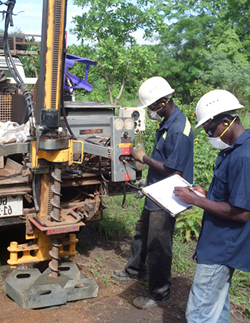 18 October 2012 – Africa continues to generate the buzz in the mining sector and Australia can be a key part of the growth story. One of Australia’s largest mining events, the African Down Under (ADU) conference, was held in Perth recently and was focused on Africa’s potential to be an economic powerhouse before the end of the century.
18 October 2012 – Africa continues to generate the buzz in the mining sector and Australia can be a key part of the growth story. One of Australia’s largest mining events, the African Down Under (ADU) conference, was held in Perth recently and was focused on Africa’s potential to be an economic powerhouse before the end of the century.
South Africa’s Minister for mining, the Honourable Minister Susan Shabangu likened the boom potential to a new dawn: “that Africa now sits at the dawn of an African Century”.
ADU delegates discussed the potential for Africa to globally dominate resources exports with huge exploration dollars pouring in a new investment wave. Explorers and miners are set on unlocking the mineral potential in many African countries, some of which were previously considered no-go zones such as DRC, Angola and Mozambique.
Investment in Africa has been positively driven not only by its potential for global market dominance in mineral deposits, but also by improved governance, regulatory frameworks and improving political stability. There is opportunity for growth projected at 4–5% a year in Africa with the potential to create massive job opportunities.
Some startling facts reported at ADU:
- Rising foreign investment from US$9 billion in 2000 to US$80 billion last year
- 30 per cent of the world’s natural resources are contained in 60% of Africa’s uncultivated land mass
- 10 per cent of the world’s oil reserves
- 200 resource companies are working on 600 projects in 42 countries
- China is its largest trading partner – with increased trade from US$3.5 billion in 1990 to over US$120 billion in 2010
- Declining fertility/mortality rates – by 2050 30% of the population will be under 15 years of age, far surpassing any other continent
- More than 800 million people projected to have entered the workforce by 2050.
Australia is well positioned to benefit from the African resources boom with the technology, skills and learning from its own boom to export.
Coffey Mining‘s delegate Chris Fredericks said Africa’s substantial mineral deposits will continue to benefit from Australian technology and skills.
“The country is ripe for some of the world’s largest projects by using modernised exploration techniques and Australia’s expertise will be valuable. Deeper reserves can be reached by using sophisticated mining techniques developed for Australian mining conditions with similar geology type.
“Australia has learnt from decades of natural resource development and has a mature and well respected mining and gas expertise.”
ADU also highlighted the challenges in Africa including investment constraints.
“Investors remain wary of corruption and resource nationalism is gathering pace in the Southern African region. Risks include sovereign regulatory framework and property rights; electricity shortages and unit costs; infrastructure weaknesses, especially in heavy-haul rail services; ports and water, and; the skills gaps. Delivering world class projects won’t be simple—it will require considerable funding skill and luck.”
Mr Fredericks concluded that mutual partnerships between many stakeholders across many countries were paramount to the nation’s mining success.
“Mutually beneficial alignment between countries and partnerships across the miners, asset owners, governments and investors is necessary. The opportunity exists to clearly define mining regulation and security of tenure that will meet project and commodity economic hurdles to provide reward for the State, developer and investor.
“In addition, developers and investors must consider human resource development and embrace social corporate responsibility to first world principals similar to what has happened in Australia,” Mr Fredericks added.











